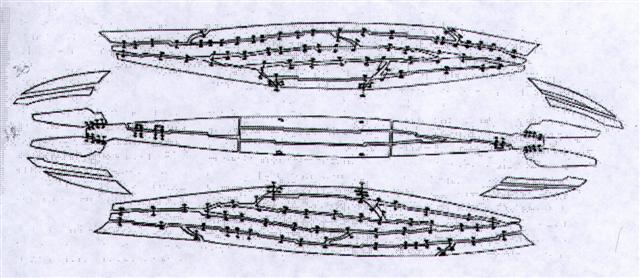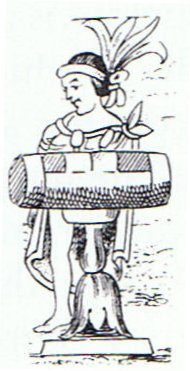TAHUA
16. And again:
 |
 |
 |
 |
|
 |
*204 |
|
Aa6-41 |
Aa6-42 |
Aa6-43 |
Aa6-44 (460) |
Aa6-45 |
| ma to ihe |
kua hoko te
rima |
kia ia etahi noho mata - kua hakanaganagana
gagata |
e kua rere te manu |
|
March 22 |
23
(82) |
24 |
Julian equinox |
March 26 |
|
ALGENIB PEGASI |
*2 =
*184 - *182 |
*3 |
*4 |
ANKAA (*5.0) |
|
JULY 18 |
(200
= 264 - 64) |
20 |
21 |
7-22 (*123) |
|
TAIL
OF THE HORSE |
*184
= 264 - 80 |
GIENAH |
LONG
SAND-BANK |
ACRUX |
|
Gaga. Exhausted,
strengthless, to faint. Vanaga. To faint, to
fall in a swoon, death struggle. Gagata,
crowd, multitude, people, population. Churchill.
Mgv.: A bird. Mq.: kaka, id. Churchill.
Pau.: Gagahere, herbs, grass. Ta.:
aaihere, herbs, bush. Ma.: ngahere,
forest. Pau.: Gagaoa, confused noise.
Ta.: aaoaoa, noise of a rising assembly.
Churchill.
... the progeny of Tu
increased: Rongo, Tane,
Tangaroa, Rongomai, Kahukura,
Tiki, Uru,
Ngangana, Io, Iorangi,
Waiorangi, Tahu, Moko,
Maroro, Wakehau,
Tiki, Toi,
Rauru, Whatonga - these were the
sons ...(Moriori myth of creation
accoding to Legends of the South Seas) |
Playing with names and numbers we could find several intriguing
patterns, e.g.:
|
Rongo |
Tane |
Tangaroa |
Rongomai |
Kahukura |
|
Tiki (6) |
Uru |
Ngangana |
Io |
Iorangi |
|
→ 10 * 15
(360 / 24) =
150 = 75 (5h) + 75 (5h) |
|
Waiorangi |
Tahu |
Moko |
Maroro |
Wakehau |
|
Tiki
(16) |
Toi |
Rauru |
Whatonga
|
|
|
9 * 15 =
135 (9h) = 75 (5h) + 60 (4h) = 60 + 225 (15h) - 150 |
|
19h / 24h
* 360 = 285 = 360 - 75
→ Jan. 20
(385) - 75 = 310 (Nov. 6)

→
Febr. 4 (35) - 15 (1h) = Jan. 20
→
Nov. 6 + 75 + 35 = 420 = 365 + 35 + 20 |
Ha. 1. Four. 2. To breathe. Hakaha'a, to
flay, to skin. Vanaga. 1. Four. P Mgv., Mq., Ta.: ha,
id. 2. To yawn, to gape. 3. To heat. 4. Hakaha, to skin,
to flay; unahi hakaha, to scale fish. Mgv.: akaha,
to take to pieces, to take off the bark or skin, to strip the
leaves off sugarcane. 5. Mgv: ha, sacred, prohibited.
Mq.: a, a sacred spot. Sa.: sa, id. Churchill.

... All four of them felt like turning back at
once, but Maui by his enchantments made the sea stretch out
between their canoe and the land ...
... At length there appeared beside them the
gable and thatched roof of the house of Tonganui, and not only
the house, but a huge piece of the land attached to it. The
brothers wailed, and beat their heads, as they saw that Maui had
fished up land, Te Ika a Maui, the fish of Maui. And
there were houses on it, and fires burning, and people going
about their daily tasks. Then Maui hitched his line round one of
the paddles laid under a pair of thwarts, and picked up his
maro, and put it on again. 'Now
while I'm away,' he said, 'show some common sense and don't be
impatient. Don't eat food until I come back, and whatever you do
don't start
cutting up the fish until I have found a priest and made an
offering to the gods, and completed all the necessary rites.
When I get back it will be all right to cut him up, and we'll
share him out equally then ..
 |
 |
 |
|
 |
 |
 |
|
Aa8-80 (1329) |
Aa8-81 (666) |
Aa8-82 |
Aa8-83 |
Aa8-84 |
Aa8-85 (1334) |
| ki to hatu huri |
ma to ua mata |
mae tae e ui hia
mai |
kua oho te tagata |
ki te henua |
- |
|
Oct 16 (260 + 29) |
17 (290) |
18 (472 - 181) |
19 |
20 |
21 (294) |
| |
|
|
THUBAN |
|
|
|
April 16 (314 *
1½) |
17 (16 * 29½) |
(365 + 108 = 473) |
19 |
ALKES |
21 (111) |
|
To.
1.
Particle
sometimes
used
with the
article
in
ancient
legends;
i uto
to te
hau,
the
ribbon
was in
the
float.
2. To
rise (of
the sun)
during
the
morning
hours up
to the
zenith:
he-to
te raá.
Vanaga.
1. Of. T
Pau.,
Ta.:
to,
of.
Mgv.:
to,
genitive
sign.
Mq.:
to,
of, for.
2. This,
which.
Churchill.
Mgv.:
To,
to make
a canoe
of
planks.
Mq.:
to,
to build
a canoe.
Sa.:
to,
to
build.
Churchill.
Huri. 1. To turn
(vt.), to overthrow, to knock down:
huri moai, the overthrowing of the statues from
their ahus during the period of decadence on
the island. 2. To pour a liquid from a
container: ka huri mai te vai, pour me some
water. 3. To end a lament, a mourning: he
huri i te tagi, ina ekó tagi hakaou, with this
the mourning (for the deceased) is over, there shall
be no more crying. 4. New shoot of banana:
huri maîka. Vanaga. 1. Stem. P Mgv.: huri,
a banana shoot. Mq.: hui, shoot, scion. 2. To
turn over, to be turned over onto another side, to
bend, to lean, to warp; huri ke, to change,
to decant; tae huri ke, invariable; huri
ke tahaga no mai, to change as the wind; tae
huri, immovable; e ko huri ke,
infallible; huhuri, rolling; hakahuri,
to turn over; hakahuri ke, to divine. P Pau.:
huri, to turn. Mgv.: huri, uri,
to turn on one side, to roll, to turn upside down,
to reverse. Mq.: hui, to turn, to reverse. 3.
To throw, to shoot. 4. To water, to wet. 5. To
hollow out. Hurihuri: 1. Wrath, anger;
kokoma hurihuri, animosity, spite, wrath, fury,
hate, enmity, irritable, quick tempered, to feel
offended, to resent, to pester; kokoma hurihuri
ke, to be in a rage. 2. (huri 4)
hurihuri titi, to fill up. 3. To polish. 4. (uriuri).
Hurikea, to transfigure, to transform.
Churchill. Mq. huri, resemblance. Sa.:
foliga, to resemble. Churchill. |


|
a1 |
90 |
90 |
b1 |
82 |
82 |
|
a2 |
85 |
175 |
b2 |
85 |
167 |
|
a3 |
73 |
248 |
b3 |
77 |
244 |
|
3 |
251 |
|
a4 |
82 |
333 |
b4 |
80 |
324 |
|
a5 |
83 |
416 |
b5 |
5 |
329 |
|
75 |
404 |
|
a6 |
39 |
518 - 63 = 455 |
b6 |
92 |
496 |
|
45 |
500 |
|
a7 |
18 |
248 + 270 =
518 |
b7 |
84 |
580 |
|
67 |
585 |
|
a8 |
85 |
670 |
b8 |
84 |
664 |
|
sum |
455 + 215
= 270 + 400 |
sum |
664 |
My idea that Ab1-1 is at the beginning of a new cycle could thus
be supported by various kinds of evidence.
 |
 |
*209 |
 |
 |
 |
*3 |
 |
|
Aa6-39 (1119) |
Aa6-40 (456) |
Aa8-80 (1329) |
Aa8-81 (666) |
mae tae e ui hia
mai |
Aa8-85 (1334) |
|
March 20 (79) |
214 = 1334 - 1120 =
670 - 456 = 294 - 80 |
Oct 21 (294) |
|
Tae. 1. Negation used in
conditional and temporal clauses: ana ta'e hoa te ûa,
ina he vai, when it does not rain, there is no
water. Also used with some verbal forms such as: o te
aha koe i-ta'e-oho mai-ai? why didn't you come?
Otherwise its use is limited to adjectives or verbal
adjectives: tagata ta'e hupehupe, person who is
not weak, hard worker; nohoga ta'e oti, endless
existence, eternity. 2. Interjection expressing
admiration, always used with he: ta'e he
tagata! what a man! Ta'e he aga! what a great
job! Ta'e he tagata koe mo keukeu i te henua!
what a good farmer you are! Vanaga. 1. Prepositive
negative: without, not, none. PS To.: tae,
prepositive negative. 2. To remain; tae atu ki,
as far as, until. Taehaga (tae 1), to
shake the head in sign of negation, reluctant, to
disdain, to be displeased. 3. Pau.: tae, to
arrive. Mgv.: tae, id. Ta.: tae, id. Ma.:
tae, id. 4. Pau.: taetae, elephantiasis in
scroto. Ta.: taetae, ill, illness. Churchill.
Ui.
To ask. Vanaga. Û'i.
To look, to look at (ki); e-û'i koe! look
out! Vanaga. Ui.
1. Question, to interrogate, to ask (ue).
Uiui, to ask
questions. 2. To spy, to inspect, to look at, to
perceive; tagata ui,
visitor. Churchill. |
Not visble (← tae e ui);
count! (hia) might possibly here suggest an effort by
Metoro to let Bishop Jaussen on Tahiti know that there were 3
days without light here.
... In China, every year about the
beginning of April, certain officials called Sz'hüen
used of old to go about the country armed with wooden
clappers. Their business was to summon the people and
command them to put out every fire. This was the beginning
of the season called Han-shih-tsieh, or 'eating of
cold food'. For
three days all household fires remained extinct as a
preparation for the solemn renewal of the fire, which took
place on the fifth or sixth day after the winter solstice
...
... Väinämöinen set about building a
boat, but when it came to the prow and the stern, he found
he needed three words in his
rune that he did not know, however he sought for them. In
vain he looked on the heads of the swallows, on the necks of
the swans, on the backs of the geese, under the tongues of
the reindeer. He found a number of words, but not those he
needed. Then he thought of seeking them in the realm of
Death, Tuonela, but in vain. He escaped back to the world of
the living only thanks to his potent magic.
He was still
missing his three runes. He was then told by a shepherd to
search in the mouth of Antero Vipunen, the giant ogre. The
road, he was told, went over swords and sharpened axes.
Ilmarinen made shoes, shirt and gloves of iron for him, but
warned him that he would find the great Vipunen dead.
Nevertheless, the hero went. The giant lay underground, and
trees grew over his head. Väinämöinen found his way to the
giant's mouth, and planted his iron staff in it. The giant
awoke and suddenly opened his huge mouth. Väinämöinen
slipped into it and was swallowed. As soon as he reached the
enormous stomach, he thought of getting out. He built
himself a raft and floated on it up and down inside the
giant. The giant felt tickled and told him in many and no
uncertain words where he might go, but he did not yield any
runes. Then Väinämöinen built a smithy and began to hammer
his iron on an anvil, torturing the entrails of Vipunen, who
howled out magic songs to curse him away. But Väinämöinen
said, thank you, he was very comfortable and would not go
unless he got the secret words. Then Vipunen at last
unlocked the treasure of his powerful runes. Many days and
nights he sang, and the sun and the moon and the waves of
the sea and the waterfalls stood still to hear him.
Väinämöinen treasured them all and finally agreed to come
out. Vipunen opened his great jaws, and the hero issued
forth to go and build his boat at last ...

|









